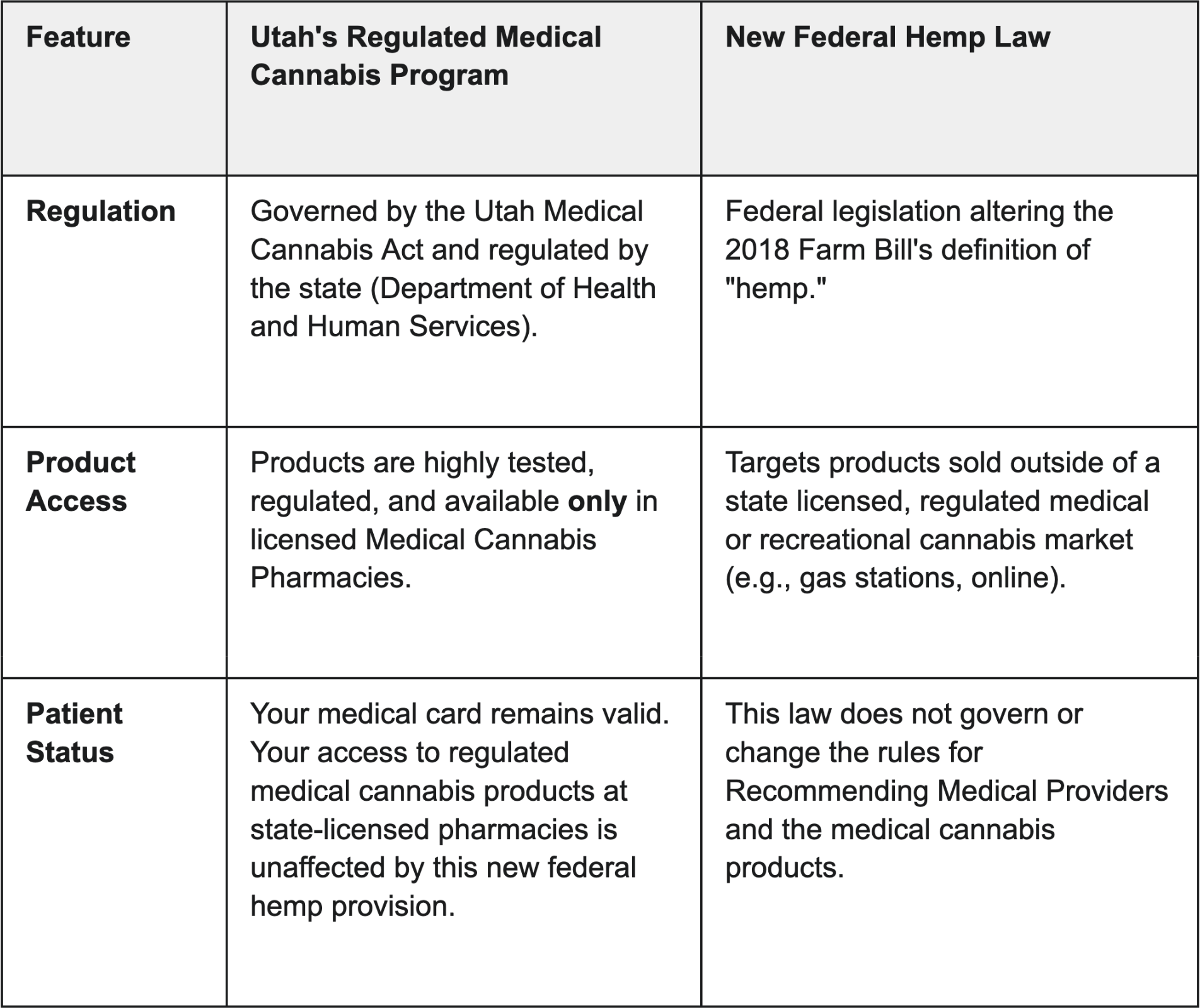The New Federal Hemp Law and What It Means for Utah
Understanding the New Federal Hemp Law and What It Means for Utah's Medical Cannabis Patients
A provision passed in the recent Congressional bill to end the government shutdown has created a major shift in the legal landscape of hemp-derived products across the country, including here in Utah. While the change targets hemp-derived products, it is important for consumers to understand how it changes product availability, but also that it does not impact Utah's state regulated medical cannabis program.
New Law: Banning Intoxicating Hemp Products
The new federal provision is designed to close what lawmakers and some state regulators refer to as a "loophole" created by the 2018 Farm Bill, and provides a one year grace period before the law goes into effect.
Key Change to Hemp Products
Federal Ban on Intoxicating Hemp-Derived THC: The new language effectively bans the unregulated sale of most intoxicating hemp-derived products, such as Delta-8 THC, Delta-10 THC, THCP, and HHC, that have recently flooded the market and been sold primarily online, but also can be found in places like convenience stores and smoke shops.
New THC Definition and Limit: The law seeks to redefine what qualifies as "hemp." Previously, the rule focused only on Delta-9 THC concentration (less than 0.3% by dry weight in the plant). The new provision broadens the restriction to cap the total amount of all forms of THC (including Delta-8, Delta-10, and others, often referred to as "THC analogs" or "artificially derived cannabinoids") in the final product.
Impact on CBD: The bill summary notes an intent to preserve non-intoxicating CBD and industrial hemp products. However, due to the low-potency limits being discussed (reportedly around 0.4mg per container in some drafts), industry advocates fear that even many non-intoxicating CBD products with trace amounts of natural THC could be swept up and become illegal.
Utah Hemp Products: Accelerating an Existing Trend
For Utah, this Federal provision adds a significant new layer to an existing state-level trend.
Earlier this year (with Utah's HB 54), the state already moved to ban the sale and distribution of intoxicating, chemically converted hemp-derived cannabinoids (like Delta-8 THC) from general retailers.
The state’s greatest challenge seemed to be their ability to enforce the law, but the new federal law will make a similar ban universal and enforceable at the federal level, potentially overriding any current state laws that may have had higher potency limits or different regulations for these products.
If the new law goes into effect, as is, the result will be a drastic reduction in hemp derived intoxicating products available for purchase online and in convenience stores.
Utah Medical Cannabis: Separate and Untouched
The products you purchase at a licensed Medical Cannabis Pharmacy are part of a separate, highly regulated system designed for patient safety and medical use. This federal law is focused on the unregulated, often highly concentrated, intoxicating products derived from hemp that were being sold to the general public.
The Controversy: Why This is a Big Deal
The inclusion of this hemp provision in a must-pass government spending bill was highly controversial for several reasons:
"Backdoor Ban": Opponents, including some members of Congress, argue that the incredibly low THC limit is an effective, backdoor federal ban on nearly 100% of the existing hemp-derived product market, destroying a $28 billion industry that created thousands of jobs post-2018 Farm Bill.
Protecting Competitors: Many claim the push for the ban was driven by the highly regulated and highly taxed alcohol and state regulated cannabis industries who view the low-cost, low-barrier hemp products as unfair competition.
Bypassing the Legislative Process: Tucking a massive policy change into a critical, must-pass appropriations bill bypassed the normal committee process, public hearings, and debate that a change of this magnitude would normally require, frustrating industry advocates and consumers alike.
Loss of Non-Intoxicating Wellness Products: Beyond the intoxicating products, critics argue the new definition is so strict it may inadvertently criminalize non-intoxicating CBD and other wellness products that have trace amounts of naturally occurring THC.
What Comes Next?
This law is expected to take effect one year after it is signed into law. This waiting period is intended to give businesses time to adjust and comply with the new federal definition. We will continue to monitor the situation closely to ensure you have the most up-to-date information regarding both the hemp market and the stability of Utah's Medical Cannabis Program.

